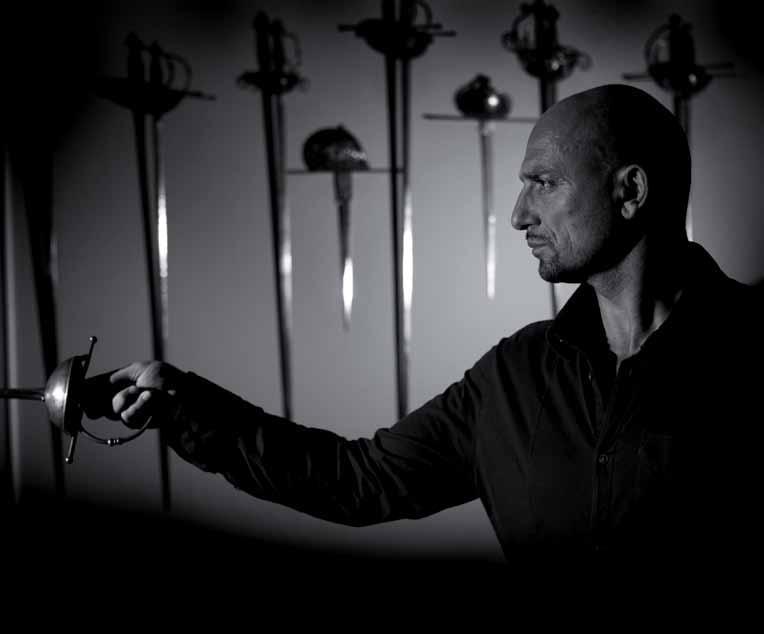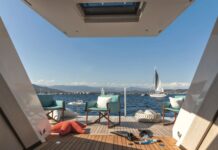Sluszny, 48, is a man who has achieved just about everything he’s put his mind to – his curriculum vitae is more than inspiring, and confirms the long-held notion that it is possible to achieve whatever we set out to, as long as we follow certain disciplines. Sluszny focuses, overcomes his fears, pays the price and therefore achieves his goals.
And his motto? “It’s not how good you are, it’s how good you want to be.” Sluszny has much to offer those who dream of greater things – our cameraman Armand Richelet-Kleinberg (himself, by coincidence, the author of the play Pour Elise: Si vous enterrer vos rêves, vous êtes déjà mort (For Elise: If You Bury Your Dreams, You Are Already Dead) has recorded our interview with Marc, which is available below and offers a more in-depth understanding of this great achiever’s personality and how you too can reach your goals.
Together: At what age did your professional career begin?
Sluszny: I went to university at 18, then I played professional tennis from the age of 20-22. Then, when I was 23, I was offered a job as a commodities trader in London – that is where my professional career started, and I did that until just a few years ago.
What was it like playing for the 1982 Belgian Davis Cup team?
My dad always wanted to play tennis. But after the war, unless you had enough money to join a club, it was hard to play professionally, so he encouraged me to play. I started at 10 or 11 with the goal of being a world champion. My hero was Björn Borg. I played Wimbledon, and the French Open, and that was great then, around the age of 22, I realized I had reached my peak and that it was time to try something else.
You swam the English Channel – what inspired you to do that?
I was looking for a new challenge. I read about someone else who had done it and I realized that it dated back to the 1800s, when an English officer escaped France by swimming back to England.
I trained for a few years, and was lucky to have a great swimming coach. He didn’t really trust my ability, but after a while we became friends, and I eventually achieved the crossing. It was very hard. You can train for everything, but you can’t prepare your body for how cold the water is.
In 1994, you tried bungee-jumping for the first time?
After my swimming adventure, I went to the movies and saw the movie Point Break (1991) with Patrick Swayze and Keanu Reeves. I thought: “How cool would jumping out of a plane be?” Then a friend and I did our first jump – it went very well, but I was really scared, and that was my first experience with real fear. We eventually gained our skydiving licences – I kept practising and improving, and I wanted to get into sky-surfing. Eventually, a Belgian movie producer approached me about doing a bungee-jump out of a hot-air balloon – the world record at the time was 4,800 metres, and the producer wanted me to break the record, so we went to 6,900 metres, and claimed the highest bungee jump ever, then, after my jump, the balloon rose to 9,000 metres and the pilot set his own record for highest-ever hot-air balloon flight.
So, tell us about your ‘sky-surfing’ experiences?
I started skydiving, and was doing more and more ‘air acrobatics’ – I was one of the first people in Belgium to begin sky-surfing and I became something of a pioneer because it was so new. I finished fourth in the world championship that year, but the winner ended up dying in a skydiving accident a year later. In fact, the 2nd and 3rd place finishers ahead of me also got hurt. I was afraid that I might be next on the list.
There must be times when you think this is all too dangerous, no? I have broken quite a few bones – quite often, when you participate in speed sports as I do, you get the feeling that you are invincible, and that can be very dangerous.
You have also done extreme mountain-climbing without oxygen?
During all these adventures, if your mind is open and you look for opportunities to expand yourself mentally, physically and spiritually, you will meet people looking to do the same. I met a mountaineer who was going on expeditions to Nepal, and I wanted to join him. We went on an expedition with the Belgian military – we didn’t make it to the top, but we reached 8,000 meters without oxygen. You’re in pain the whole way, you’re freezing cold, you’re starving, you’re thirsty, you can’t get any oxygen – not a pleasant experience. We even survived an avalanche along the way – it came while we were sleeping in camp. It sounded like a train barrelling toward us – when we woke up in the morning, we had to dig ourselves out of the snow.
So, what has been your scariest moment?
I’ve had a lot of very scary moments. I was at the doctor’s one day, and he was checking me out. He examined my heart and said he could see a scar on my heart. He asked me if I had been scared in my life – he told me that the scar was not a scar from cutting, but from my heart stopping, and I told him that I believed it had stopped more than once, in fact. I’ve been stuck in an underwater cave while scuba-diving at 100 metres, I’ve been in an avalanche, and I’ve had my parachute not opening for a couple of seconds during a base jump. There have been several moments when I’ve been really, really afraid.
What has been the most difficult thing you’ve faced?
Well, I think it was difficult to achieve the level of self-confidence so I could continue even when others said I wouldn’t make it, and overcoming the fears that we all have within is a constant challenge. Such fears are excuses to not try something, because we are afraid of failure, and are still the biggest hurdle I have to overcome.
And your relationship with Mumm Champagne?
I was lucky to be introduced to them in 2009. After meeting the Mumm people there, they were surprised at how their mottos and values were very close to mine. For them, achievement, taking it to the limit, overcoming boundaries, and being the best are very important – they thought we could pass on that mentality together, to give the feeling of achievement, of surpassing their limits. That’s how it all began.
Your proudest moment?
In the beginning, when I started playing tennis, playing for my country was my proudest moment. Since then, I’ve achieved so many fantastic things and I’ve been able to experience so many amazing adventures, that I’m happy to say I’m proud of almost everything I’ve done. What’s your biggest challenge now? Passing on a little bit of the knowledge and the view I have of life, and to try to explain to people how they can motivate themselves and motivate others to reach greater heights.
How would you like to be remembered?
I definitely would like to be remembered as someone who was courageous, as someone who was righteous, as someone who maybe was enlightened and was able to pass it on to people around him. I would like to be remembered as someone who lived at 200 miles an hour, and enjoyed every moment that he lived.







